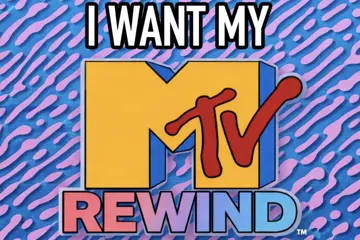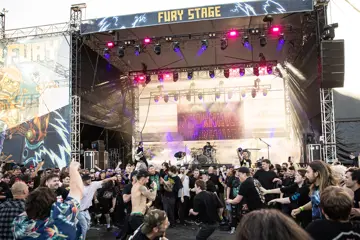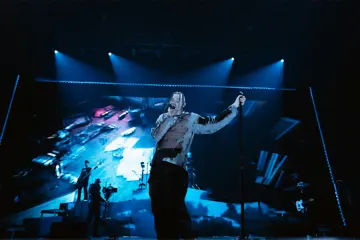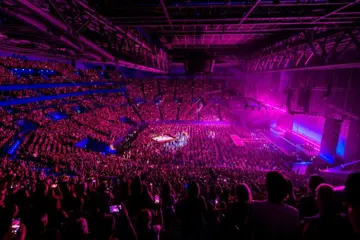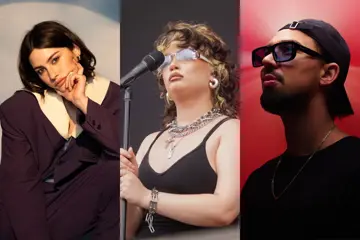The Bezerker play the QUT Club, Gardens Point on Saturday. Dissimulate is in stores now.
It’s certainly a mark of prestige that an Australian performer should find a home on Earache, one of the worlds formative grindcore labels, and home of some of the most highly regarded international extreme metal acts. Hailing from Melbourne, The Bezerker has just released their second album Dissimulate, easily one of the most sonically damaging slabs of sound o emerge in the last twelve months. The Singer from The Bezerker explains the band’s background.
“I used to make speedcore/hardcore electronic music for quite a while. The first EP I put out came out through Industrial Strength in the UK. Digby (Earache’s owner) happened to come across the record back in 1996. About six months after they contacted me to do some remixes for Morbid Angel, so I went ahead and did that. I went over to Europe for some shows in 1998, and went to the UK to see how the remixes were doing, and I had some demos on me for the first Bezerker album. Earache were interested in checking the demos out. It took ten months to sort it all out.”
While Dissimulate features a full touring back line up, The Bezerker’s first album was very much a solo effort, with extra musicians recruited to lay down already written tracks.
“The material on the self titled record is pretty much a compilation of everything I had lying around from 1996 to 1998, although I did have another member with me. The majority of the material was written by myself. Dissimulate was written with the full band, and we had a lot of input from all the members. I kind of view this as our first album as a band. Part of the deal with Earache was that they would put out the album, and I had to put a band together. It took quite a while to find a line up that could perform the material and that I could get along with.”
“Now I’m just The Singer. I’m not driving the samples anymore, it’s running from a disc with a click track metronome for The Drummer. It allows us to play incredibly tight, and maintain the speeds that are on the album. He can’t have a night where he’s tired,” The Singer laughs. “He’s got to play that fast or the samples go out of time. It’s more pressure for him, but in the long run we’re a tighter unit.”
Sounds like you’re a tough taskmaster.
Don't miss a beat with our FREE daily newsletter
“Always. I’m the worst. I figure out the music and bring it in, and it’s like ‘Christ, how am I supposed to do this’,” he laughs. “That’s usually the general vibe. People bring in riffs, and I cut them up, put them on the sampler and re-arrange them, then they have to relearn the songs they’ve brought in. It keeps people on their toes, anyway.”
Once the line up was solidified, The Bezerker headed overseas, and this current Australian album launch tour finds the act in Queensland for the first time.
“Only one of the guys toured overseas with us. When we got back we got a new drummer from Perth and the guy that was playing guitar switched to bass and we got another guitarist from here in Melbourne.”
Once again, the band recorded at home, using a computer as a studio.
“It just allows us to work at our own pace, go jump in the pool or whatever. It’s a lot more of a relaxed atmosphere. I played drums in death metal bands back in the early 90s, and I found that studio environment is very hard to get the right take or the right feel. We tracked it all with Pro Tools and then drummed it over to a PC. I mixed it all once it was done. We can burn a copy of the mix, jump in the car and go for a drive to see how it sounds or whatever. It’s a bit harder to do that in your traditional studio.”
Was working as a drummer what got you into electronic music?
“Actually I had a car accident back in 1995. I injured my back and I couldn’t play drums. I wanted to keep making music, so I sold my drum kit and the idea was to buy an electronic kit. I never quite had enough money, but I could afford a sampler, so I just started programming until I had enough money,” he chuckles. “I never had enough money.”
Closing out the album is a cover of Carcass’ Corporal Jigsore Quandary driven by a crunching electro pattern.
“I used to cover it in an old band. That was the peak of the genre before it started to crumble out. We really wanted to keep it faithful to the original with out own sound. Re-capture the sound and vibe of early death metal. I think that was my favourite time as a death metal fan, and we wanted to bring some of those feelings back.”






